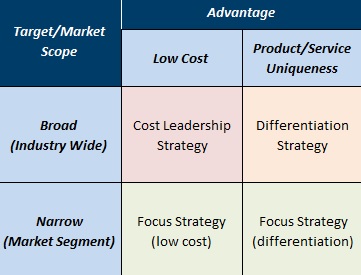- Business Concepts ›
- Marketing and Strategy ›
- Generic Strategies
Generic Strategies - Definition & Meaning
This article covers meaning & overview of Generic Strategies from marketing perspective.
Generic Strategies Definition
Generic strategies as the name suggests are generic in nature and is a way for a company to pursue its competitive advantage across the market scope of choice. While the advantage can be in the form of low cost or product differentiation the scope can be broad (Industry-wide) or narrow (Market Segment). Keeping in mind these advantages and scope three generic strategies can be made: Cost Leadership, Differentiation Strategy and Focus Strategy (Low Cost or Differentiated)

Cost Leadership Strategy:
This strategy is based on acquiring a high market share by appealing to cost-conscious and price-sensitive customers. This is achieved by having the lowest price in the targeted segment, or having the best perceived value for the service or product received compared to the price charged. To achieve profitability and a high return on investment, the firm needs to operate at a lower cost than the competitors. The strategy ensures high market share and price advantage in case of a price war. In order to achieve or successfully implement the cost leadership strategy the company needs to achieve high utilization, in order to reach economies of scale so that it has the lowest manufacturing costs possible. Low costs can also be achieved by having more standardisation, better efficiency, more expertise, less advertising (and administrative) costs and an efficient distribution system to aid the production.
Eg. Walmart through its chains and high spread network is able to acquire goods at very low prices giving it a cost advantage which it uses in its everyday low price (EDLP) program to ensure customer satisfaction by ensuring maximum savings
Differentiation Strategy:
A differentiation strategy is highly useful when competing in a highly competitive market and the product and its customers are not price sensitive. Differentiation helps in ensuring higher profit per unit and building a brand loyalty in the long run. It requires creating a uniqueness in the product or service that increases its perceived value and causes them to believe that the product is better than those offered by the competitors. Because of differentiation the company is able to charge a premium over the standard product ensuring loyalty and better margins.
Firms which implement this strategy have innovative processes, talented personnel, Technical expertise, research and development infrastructure and investment, and strong sales and marketing team which is able to pitch their product to the right customers in the desired way.
Eg. Apple has its own UI, OS and hardware which focuses on improved customer experience resulting in a higher brand perception and differentiation from its competitors
Focus Strategy:
It focuses on a narrow segment and tries to achieve cost advantage or differentiation within the segment. It focuses on particular needs of a segment and appropriately gets its name accordingly. Due to a focused segment the company gets a high customer loyalty but due to low volumes the companies have lower bargaining power hence higher costs. Companies in this segment due to their understanding of the customers is able to create a broad range of products to satisfy their customers.
Eg. South West Airlines offered short haul point to point flights in contrast to hub and spoke model followed by other carriers
Hence, this concludes the definition of Generic Strategies along with its overview.
This article has been researched & authored by the Business Concepts Team which comprises of MBA students, management professionals, and industry experts. It has been reviewed & published by the MBA Skool Team. The content on MBA Skool has been created for educational & academic purpose only.
Browse the definition and meaning of more similar terms. The Management Dictionary covers over 1800 business concepts from 5 categories.
Continue Reading:
What is MBA Skool?About Us
MBA Skool is a Knowledge Resource for Management Students, Aspirants & Professionals.
Business Courses
Quizzes & Skills
Quizzes test your expertise in business and Skill tests evaluate your management traits
Related Content
All Business Sections
Write for Us